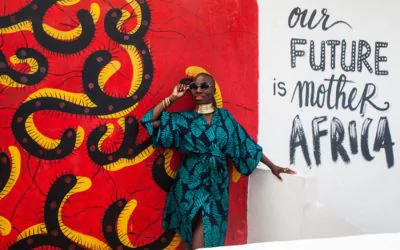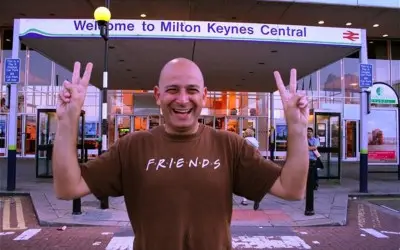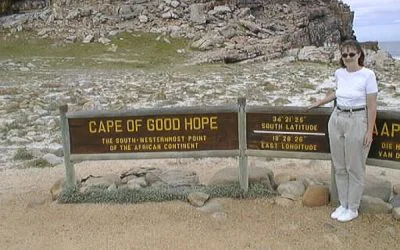We are incredibly happy to be publishing what we believe is the first English-language interview with Britt-Marie, the first woman from Sweden, and all of the Nordic countries for that matter, to complete all UN countries. An incredibly active all-rounder, she tells us a little about everything that makes her a true legend.
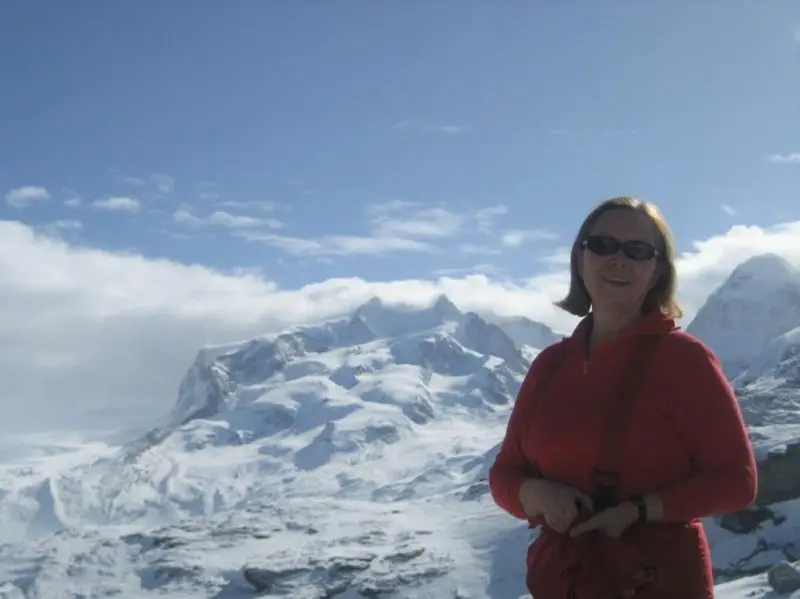
Skiing in Cervinia, Italy
Britt-Marie, tell us something about your early years and how your love of travel developed.
I made my first trip abroad to Germany, at the age of five, together with my parents. I still have a strong image of how devastated Germany was after the Second World War. In the 50s and the 60s charter tourism began and my parents brought me along to Mallorca and the Canary Islands. In my teens in the 60s I started to travel around Europe on my own, mostly hitchhiking. I got a lot of friends, came to know many different cultures and was able to practice different languages. My curiosity, need for challenges and love for travel is in my genes. In fact, researchers have identified a gene, DRD4-7R, also called the “wanderlust gene”, because of its correlation with increased levels of curiosity and restlessness. This gene is found in about 20 percent of the population, and for sure I´m one of them.
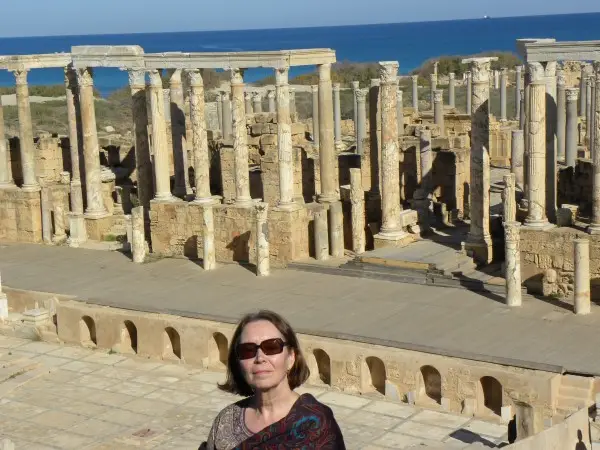
Leptis Magna, Libya
What would you say is your motivation for travelling?
What motivates me in my travelling is to get a picture of the world, like laying a huge jig-saw puzzle. I always prepare for my trips thoroughly by learning about geopolitics, culture, social patterns and religions. That way I can take in more easily what I see. As a high school student I worked during weekends and spent everything I could save on travelling during holidays. In Europe it is easy to travel overland and I often stayed at youth hostels. When I was 18 and finished high school I bought a Citroën 2CV and camping equipment with a friend with the goal to travel around the Mediterranean starting in Paris, going through Switzerland, Italy, Tunisia, Algeria, Morocco, Spain and back to Paris.
After covering most of Europe, also some of the countries behind the “Iron Curtain”, I wanted to widen my horizon and decided to take half a year off from my university studies to explore Latin America together with a friend. We flew from Sweden to Mexico City and from there on, through Central America and on the South American continent we travelled overland; with buses, hitchhiking or like in Bolivia sitting on top of a truck, loaded with bundles of coca leaves. With increasing age and responsible positions in industry. my disposable income increased. But then time became a scarce resource and my travel pattern changed to shorter trips, using airplanes and staying in better hotels.
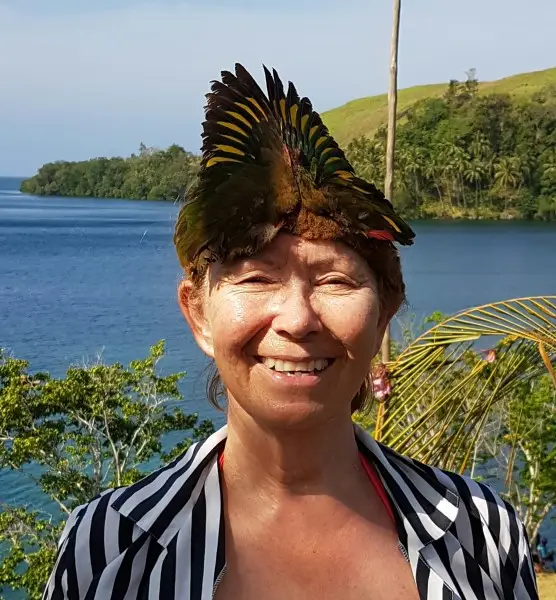
Feather Head-dress, Papua New Guinea
To what extent do you believe that your country of origin has influenced who you are and your perception of the world?
Even the Vikings were great travellers and during the 17th century Sweden had a period as a great power with an important navy and army that conquered large parts of neighbouring countries. Sweden even had a colony in Ghana, engaged in the slave trade and St Barthelemy was a Swedish colony for about one hundred years. Sweden is a seafaring nation (not as important as Spain or Portugal, however) but I think it proves that Swedes are open to the world and there has always been a drive to get to know other countries. Not to mention all those Swedes (probably all of them with the Wanderlust-gene) that emigrated to the US in the 19th century. That said, I think that many Swedes are open for other cultures and adventures. During the years when I grew up in Sweden it was a progressive period with a lot of hope for the future, increased standard of living and freedom for the young generation. This enabled me to travel and to get to know the world.
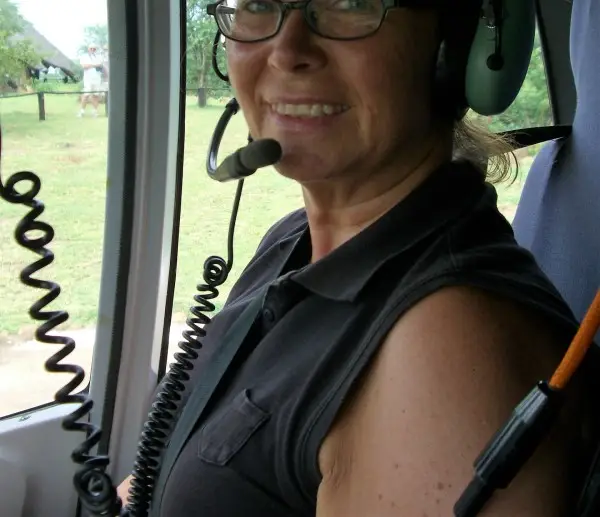
Helicopter at Victoria Falls
And how do people around the world react when they find out you are Swedish?
Usually with curiosity. But there was a period when you had to fight the misconception of the “Swedish free love”. Outside Europe most people do not know where Sweden is located geographically and they often guess Copenhagen is the capital. But as soon as you start talking soccer, everybody no matter where in the world, knows about Zlatan Ibrahimovic.
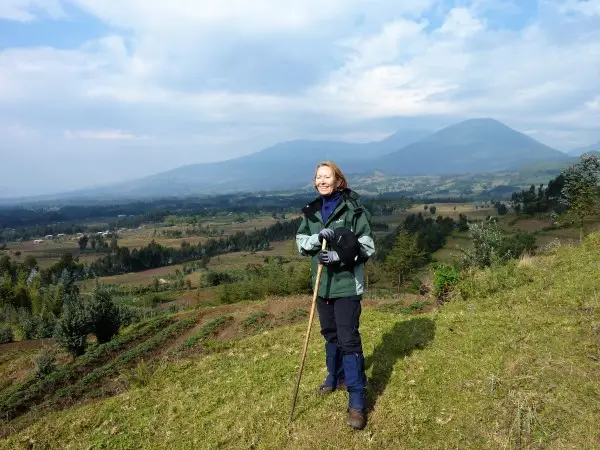
Trekking up to the goriilas, Virunga, DR Congo
You are now one of the few women to have been to every country in the world. Why do you think men are so much more ‘ahead’ compared to women in terms of this achievement, and what does it mean to you to be the first woman from Scandinavia to do this?
I feel proud of being the first Swedish lady to achieve this, and one of very few in Europe. It was only until very recently that I understood that there were so few women that had done it. All in all we have identified 24 ladies with all UN193. That makes it only 10% of the total amount of people with full score. So why are 90% men? Studies show that there is a gender difference in competitiveness and risk taking and that men are more inclined to take risks and challenge things. And you can look at almost any sector in society, for example the lower percentage of women in leading positions or on the board of companies; or percentage of women vs men in government (with a few exceptions, like Rwanda). So, girls; believe in yourselves and stand up for what you want to do. The sky is the limit!
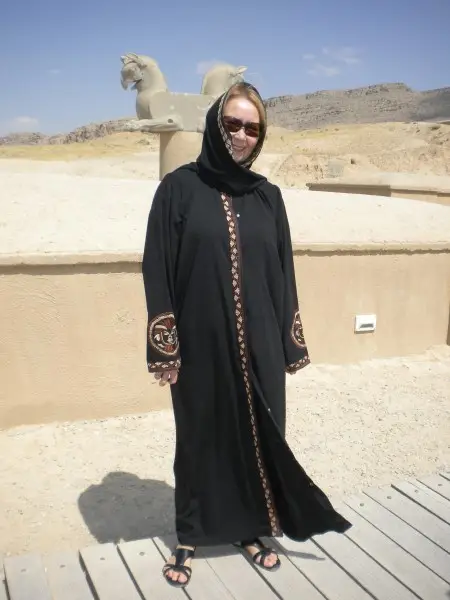
Persepolis, Iran
Of the countries you visited, which one surprised you most, positively and negatively?
As I always try to prepare myself thoroughly before I travel, I seldom get surprised. As a positive surprise I would like to mention Rwanda that amazes me every time I have been there. First of all how they handled the aftermath of the genocide but also to see how clean the whole country is and to follow their struggle to become an important nation in East Africa. And just the fact that they banned the use of plastic bags more than 10 years ago!
On the negative side I would like to mention all countries where corruption is rife and the lack of waste handling that I have seen in so many parts of Africa. It´s disgusting to see. And also to find out that in many nations, especially in the Pacific, people forgot how to cultivate their land as generations before them did. Today it´s a sign of wealth to be able to afford soft drinks, imported canned fruit and canned meat. This leads to extensive obesity, diabetes and vascular diseases. Many countries in the Pacific have the fattest people in the world! It has also shocked me to see the impact of China all over the world. How dependent many countries get to China and will they ever be able to pay back the loans they received from China without giving away their natural resources?
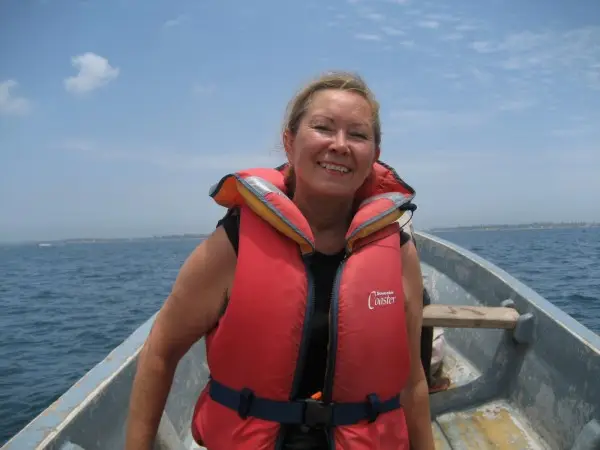
On the way to Mussulo island, Angola
Tell us a couple of travel stories which have really stuck in your mind.
What I remember mostly from my trips are the encounters with nature, live animals and people.
I have dear memories from Machu Picchu in Peru. Machu Picchu is a World Heritage Site and now also on the list of the seven new wonders of the world. We decided to stay for a few days and learnt that there was a cave on top of the adjacent mountain, called Huayna Picchu in quechua. As we did not have money to stay in the hotel we decided to climb the mountain and sleep in the cave. Huayna Picchu is 260 meters above Macchu Picchu and the view from there over Machu Picchu is breath-taking. The climb is called “stairs of death” and you can check on Youtube if you want to get the feeling how it is to do the climbing.
I had a weird experience in the aftermath of Eastern Germany. I used to travel often to East Berlin in the 60s. I visited friends and always stayed at my friend´s family house. During the train ride from northern East Germany to Berlin I was always interrogated by the police and when I left the train station to go to my friend´s house I was followed to my destination by a black car with dark windows. After German reunification, the surveillance files that the Stasi (State Security Service) had maintained on millions of East Germans were laid open, and my friend requested to see his file and showed it to me. All my whereabouts were registered, my photos and letters were there and it was scary to realize that the Stasi had been spying on us all the time. Only after the death of my friend’s father he learnt that his father had been working for the Stasi as well, so it must have been very embarrassing to have somebody from “the West” staying in their house. Especially as the Stasi are known to be one of the most effective and repressive intelligence and secret police agencies ever to have existed.
While in Saudi Arabia, my girlfriend and I hitchhiked with a young Saudi boy. He asked us to sing a Swedish song. You might know that in Sweden we have special lyrics that we sing when we drink aquavit. So we sang a couple of “aquavit songs” in the back seat of his car, dressed in our burkas.
I have been married to the same man for 44 years, and we got married not only once, but twice! The second time was during our trip to Yemen. We were dressed up in typical Yemeni wedding outfits and they held a ceremony for us. The wedding party took place in a tent, drinking tea and chewing khat.
Other fantastic memories are the encounter with live animals, such as walking around among the sea elephants at Half Moon Bay in California. The males that weigh up to 3500 kg are fighting with each other over the females and mating as many females as possible. The females are lying there giving birth and suckling their new-borns. Then the sea elephants spend another 9 months at sea before coming back and the procedure starts all over again.
Another remarkable place is Galapagos with its unique wildlife; the iguanas, the giant tortoises, swimming with sea lions and dolphins and the variety of tame birds that come and sit on your shoulder.
One of my most awesome and unforgettable experiences with animals and the absolute highlight of all safaris was the encounter with the mountain gorillas in the Virunga Mountains in Rwanda. After a couple of hours trekking you reach the gorilla family and it is difficult to describe the exhilaration you feel when you stare into the eyes of a huge Silver Back.
Last, but not least are the memories from the encounter with people that made an impact on me.
When I was 16 and hitchhiked to France I got the idea I wanted to go and live in a convent. So I went to the Notre Dame Cathedral and approached some nuns and asked them if I could come and stay at their convent. They had to ask the mother superior first and I promised to come back to Notre Dame the following day to give me an answer. Next day we met again and they said I was welcome to the convent. I stayed there for a week, helping in the kitchen and every day I sat for an hour with the mother superior in the garden of the convent discussing life. I think these philosophical talks opened up my interest for different religions and thanks to my traveling I was able to learn a lot about the major world religions.
My special interest is to study the conditions for girls, women and vulnerable people in the world.
I worked for Doctors without Borders (MSF) in Angola for 6 months, a few years after the civil war was over but cholera was still spreading. As I speak Portuguese I was able to talk to people with HIV/Aids and tuberculosis, with fishermen and vendors at the market and that way got a good insight in the lives of people.
Another occasion when I was able to study the vulnerability of people was in the Mukuru slums in Nairobi. Through my Rotary Club in Stockholm and a Catholic Religious Congregation I initiated a project to build a Family Centre in the slums.
Through my voluntary work I was acting as a board member for the Swedish Fistula Hospital Foundation that helps women, mainly in Ethiopia, to get cured from their injuries and stigmatization after child birth. It was so touching to hear the stories of these women that had been rejected from their husbands as they could never get pregnant again due to their injuries and they very often ended up in prostitution.
In Hargeisa, Somaliland, I had a fascinating conversation with a couple of young girls at a government office. We had to get a special permit to leave Hargeisa to go to see the cave paintings at Las Geel and to the coast. It had not been raining for months so all male government officials had gone to the mosque together with the president to pray for rain, so we had to wait to get our permission. The female employees stayed at the office and I was able to have a candid conversation with the girls about their lives. They were all circumcised, as most women in Somalia. Usually in Somalia women get infibulated, which means that they cut away all the genitals. One of the girls was married and she told me that three days before her wedding she had to undergo surgery to cut her open to allow intercourse. Just imagine the life of these women! The good thing was that they all said that they would never allow their daughters to get circumcised.
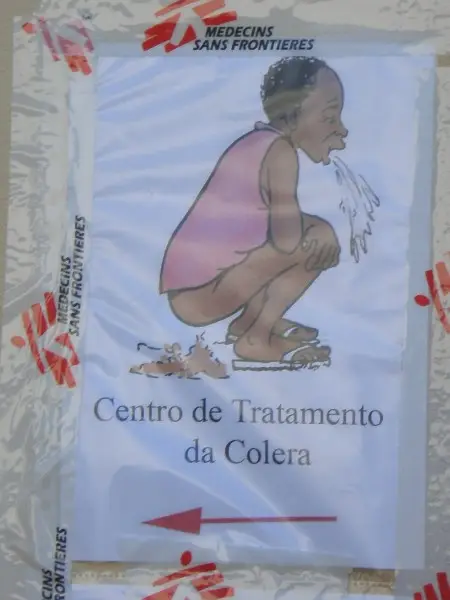
Info ad for cholera treatment in Angola
What can you never travel without?
Comfortable shoes, a small medical kit, sun shield, eye shade and compression socks.
I always download a couple of good books, tourist information, maps and movies to my tablet. And a couple of interesting pods to my cell phone. Do not forget an adapter as power outlets are different! I always bring a copy of my passport and of the visas, in case I lose the passport. Make sure that you have a good travel/health insurance and that you have all required and recommended vaccinations.
And I travel light – preferably only with cabin luggage!
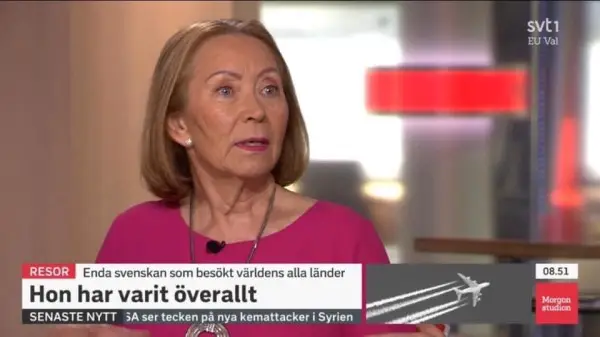
Interview on the morning news, Swedish TV
How have your family and friends taken your exploits?
My husband and my children seem to be very proud of my achievement. But now they long to have me around a little more, especially giving a helping hand with the grandchildren!
Many friends have congratulated me out of their heart and are truly happy for me. But Swedes have a tendency to be envious and sometimes I have noted that reaction also. In the Nordic countries we also have something called the Law of Jante, portraying a person as overly ambitious or inappropriate. This code of conduct more or less says that “You should not believe you are special because you have been to all countries in the world”!
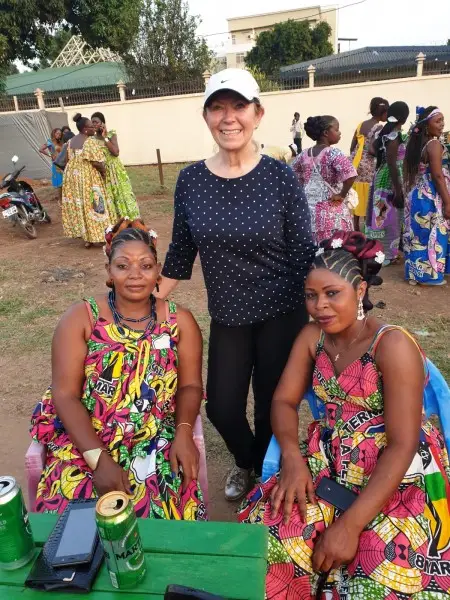
Celebrating International Women’s Day in Bangui, Central African Republic
So now that you have completed all the countries of the world, what is next?
There is still so much to discover in the world!
I hope I will never lose the drive and the curiosity to get to know new places and meet people. I will probably focus more on nature and on my bucket list I have trips to Patagonia, the national park Torres del Paine in Chile, Antarctica, Alaska, Faroe and Greenland. This summer I´m back in Greece to visit some islands where I have not been before. And I´m looking forward to a more relaxed travelling in southern Europe, visiting small villages and vineyards.
The road goes on for ever and the journey never ends!
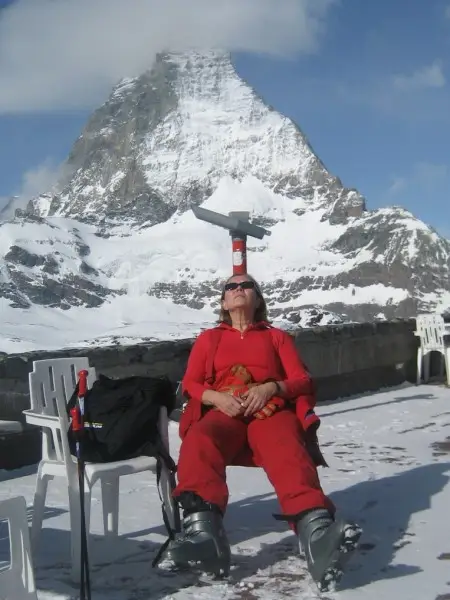
Enjoying skiing at Matterhorn
And our signature question – if you could invite any four people from any period in human history to dinner, who would you invite and why?
There are so many people I would like to meet and talk to, to start with practically all persons that have been awarded the Nobel Peace Prize, but I have chosen 2 women and 2 men:
Ester Blenda Nordstrom (1891–1948) was a Swedish journalist, author and explorer. She used a form of investigative journalism that received a lot of attention. I would like to talk to her about her driving forces and how it was to be a professional woman one hundred years ago; about her adventures in Lapland, USA, Latin America and Kamchatka and about her homosexual relationship with her beloved girlfriend.
Hans Rosling (1948–2017) was a Swedish physician, academic, statistician, and public speaker. He was the co-founder and chairman of the Gapminder Foundation and listed as one of 100 leading global thinkers. He worked in Africa for many years and gave courses on global health. Rosling’s research also concerned links between economic development, agriculture, poverty and health. He was a health adviser to WHO, UNICEF and several aid agencies. He was one of the initiators of MSF in Sweden. I would like to talk to him about his views of humanity’s future, based on his research. And about the years he worked in Africa, about his mission to Cuba and his role in the Ebola Virus Epidemic outbreak in Western Africa.
Queen Christina of Sweden (1626–1689). At the age of six, Christina succeeded her father upon his death but began ruling the Swedish Empire when she reached the age of 18. Christina is remembered as one of the most learned women of the 17th century. She was fond of books, manuscripts, paintings, and sculptures. With her interest in religion, philosophy, mathematics and alchemy, she attracted many scientists to Stockholm, wanting the city to become the “Athens of the North.” She was intelligent, fickle and moody. She caused a scandal when she decided not to marry and in 1654 when she abdicated her throne and converted to Roman Catholicism. She is one of the few women buried in the Vatican grotto. Her unconventional lifestyle and masculine dressing have been featured in countless novels, plays and operas. I would like to talk to her about how it was to become a queen at the age of 18, about the life at the Swedish court those days, about her driving forces and why she took the decisions she took.
Desmond Tutu, born in 1931, is a South African cleric and theologian known for his work as an anti-apartheid and human rights activist. He was awarded the Nobel Peace Prize in 1984. I would like to ask him about his struggle against apartheid together with Nelson Mandela and his work in the truth and reconciliation commission after apartheid. He was very engaged in the combat of the HIV/AIDS pandemic and despite being an archbishop he was campaigning for gay rights and legalised assisted dying. And I would like to have his view on the actual situation and future in South Africa.
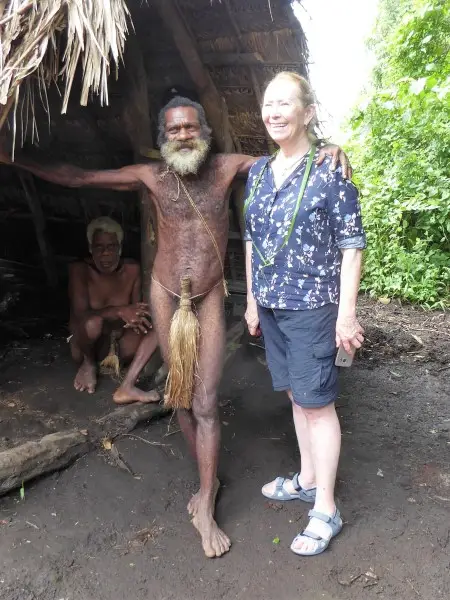
With the medicine man, Vanuatu
The photos in this interview are from Britt-Marie’s personal collection and we thank her for sharing her images with us here at NomadMania!
